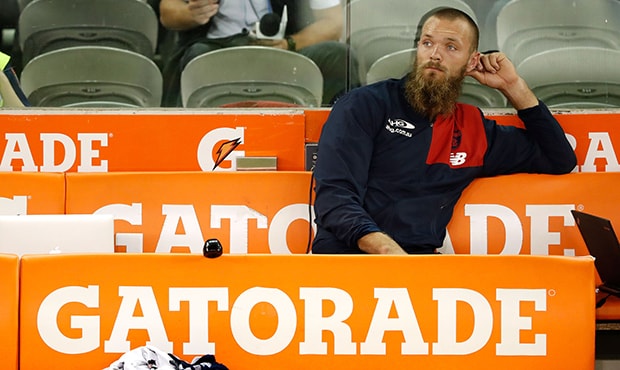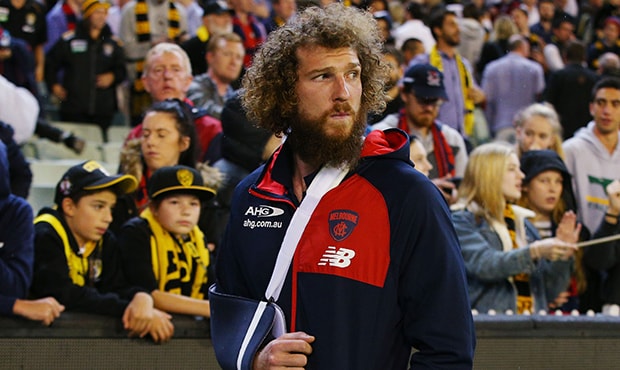MELBOURNE entered November with every reason to be confident in its ruck stocks.
Its list contained All Australian ruckman Max Gawn, a handy back-up Jake Spencer and a 'third man up' specialist in new recruit Jordan Lewis.
It expected Mitch King to return from a second knee reconstruction and develop with the Casey Demons.
Meanwhile rookie Lachlan Filipovic was a long-term prospect after showing good signs with Sandringham after converting from soccer and basketball.
However in December, with little warning, the 'third man up' was banned.
The Demons immediately lost the Lewis option.
Then in rounds three and five when they lost Gawn and Spencer respectively during games, the ruling arguably caused them to lose a whole lot more, as the tactics available to cover for the injured ruckman's absence were reduced.
Against Geelong, despite Jack Watts battling hard against the odds, Melbourne lost the capability to continue the inside 50 advantage of 32-18 it had at half-time into the second half.
It was overrun by 32 points in the final quarter and lost the inside 50 count by two in the second half.
Against the Tigers it led the inside 50 count 39-20 at half-time.
In the final quarter, without Spencer, Melbourne lost the inside 50 count nine to 22 and were once again outscored by 33 points in the final quarter.
Imagine if Clayton Oliver and Watts had been able to double team Zac Smith or Toby Nankervis.
Would that have turned losses into important wins?
The long-term loss of All Australian ruckman Max Gawn is a big blow for the Dees. Picture: AFL Photos
In the next six weeks, with Gawn and Spencer sidelined, that December ruling might bite even harder as neither King nor Filipovic are ready to step into the AFL team.
It means first-year coach Simon Goodwin will have to be innovative to create a system that keeps the Demons' season alive in the next six rounds against Essendon, Hawthorn, Adelaide, North Melbourne, Gold Coast and Collingwood.
Sam Frost might get the job with Watts acting as back-up, as happened on Monday night.
Watts has been good but he will be cooked if he takes on the ruck for the next six weeks.
In any event, his class is needed elsewhere.
Frost is a competitor who has speed and can jump, but he is just 194cm.
Cam Pedersen is another option after a reasonable game in the VFL, however he may be needed as a forward to replace Tim Smith, who punctured his lung against Richmond, while Oscar McDonald could go down back to replace Frost.
Another option is to leave out Pedersen and use Watts as a second forward/ruckman and have Lewis pinch-hit in the ruck too.
Lewis has shown he has a leap so he might be deployed occasionally at boundary throw-ins, mixing and matching midfielders as the nominated ruckman to confuse the opposition and the opposing ruckman.
Don't laugh.
Using midfielders in the ruck is becoming more common with Shaun Grigg having a crack for the Tigers at times this season.
Regardless of who nominates as the ruck, the other imperative for the Demons, particularly on a fast deck such as Etihad Stadium, will be to get numbers around the ball to stifle the opposition.
It is something Melbourne is good at however its players will have to use the ball well when exiting stoppages because it will be outnumbered in other areas of the ground.
Alternatively it could put numbers behind the ball, conceding the stoppage to some extent and use pace and guile to rebound hard against the opposition, creating scoring chances in open space.
It's a tough ask but a good challenge for Goodwin and his team's desire to play fearless football.
Back-up ruckman Jake Spencer's injury has put Melbourne in a pickle. Picture: AFL Photos
Melbourne's situation (and the impact of the 'third man up' ban) also raises the question once again as to whether clubs should be able to look beyond their list to offer ruckmen in state leagues a short-term contract to cover such contingencies.
This is not a new idea but the removal of the 'third man up' has made losing a ruckman – never ideal – even more destabilising.
It could have the potential to undermine the competitiveness of a team with lesser talent than Melbourne.
That alone makes mid-season trades and short-term contracts as ideas that should be given real consideration.
Particularly with time being spent considering radical restructuring of the fixture and stronger draft mechanisms put in place to maintain competitiveness.
Yet list restrictions that reduce mid-season flexibility are something of an anomaly and work against that objective.
Goodwin can't worry about that now. He has to put a plan in place for the Bombers and beyond.
If he can produce a winning formula his reputation will only get stronger.
And our thinking as to what is possible might shift once again.


